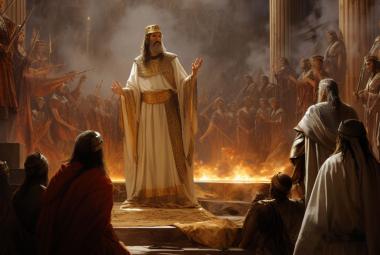Many of us fail to really appreciate the remarkable - yet often misunderstood - epistle written by Jacob to the descendants of Israel. (Jacob means the supplanter; heel-catcher; tripper-up. 1 It is Ya'kov in Hebrew, translated Jacobos in Greek, Jacques in French, Iago in Italian, Diego in Spanish, and James in English.)
Which James?
There were four James's in the New Testament: James, the son of Zebedee, brother of John the beloved disciple. He was called to be a follower early2 and became, with his brother John and Peter, one of the insiders.3 (He was slain by Herod very soon after Pentecost.)
Another was James, the son of Alpheus, the brother of Judas (not Iscariot). Another was James, the father of Judas (not Iscariot), 4 identified as one of the twelve5 and is probably to be identified with Thaddaeus.6
However, the author of this epistle, we believe, was the brother of our Lord. He was considered by the early church as a son of Mary and Joseph7 (Jerome, Augustine, et al.). This James, along with the Lord's other brothers, was an unbeliever before the resurrection.8 (It is believed that there were only the two other James's at the cross. It is interesting that apparently encrypted within the Old Testament text of Isaiah 53 - that pinnacle of Messianic prophecy - are "equidistant letter sequences" which include 40 names of people that were at the cross. What is provocative is that there are only two James's. Also, Judas is a conspicuous omission.)9
However, the resurrected Lord appeared to James. 10 James then emerged as the prominent leader in the Jerusalem Church,11 and those going to the other churches founded by Paul are said to have come from James 12 (although he had already disavowed having authorized them to use his name as an endorsement of their legal teachings 13).
Contrary to Paul?
Some feel that this epistle appears contradictory to Paul's teaching, but the ostensible differences are easy to understand. Paul focused on our justification before God. James focuses on the believer's justification before men.
Faith is not believing in spite of the evidence; faith is obeying in spite of the consequences.
James was intensely Jewish, as evidenced by his advice to Paul when he came to Jerusalem bringing alms for his nation , and when he suggested that Paul should be at charges for some brethren who were about to complete their Nazariteship.14
The epistle evidences a closer connection with the Sermon on the Mount than any other New Testament letter.15 It contains 60 imperatives in 108 verses; more than any other New Testament book.
A conspiracy led by Annas the Younger, the son of the high priest Annas, illegally arranged for the execution of James in 62 A.D. 16 The execution of the popular James may have been a key event in the circumstances that led up to the rebellion and its subsequent squelching by the Romans in 66-70 A.D.
This epistle of James may have been written early, right after Pentecost (Acts 2), perhaps after the scattering in Acts 8:1-3. If later, it may have been written to correct a misunderstanding bordering on antinomianism on the part of some who were pushing Paul's teaching to an extreme he never intended.17
To Whom Written?
This epistle is addressed to the Twelve Tribes. Notice that ten are not missing.18 These are the same of whom Paul speaks in his address before Agrippa.19 These are the same as addressed in 1 Peter.
The "True Gospel" of James?
James is strangely the focus of a number of related heresies and attempts at historical revisionism. A frequently encountered proposal is that Jesus led an entirely Jewish sect and that he was succeeded by his younger brother James, the first Bishop of Jerusalem. It is claimed that the role of James appeared as a threat to the Roman Catholic Church, evidenced by its controlling history and removing information about this important figure.
(In 1996, Pope John Paul II issued a statement declaring that Jesus was Mary's only child, and therefore not his brother after all. 20 )
This view puts Paul in opposition to James as a later intruder. These heresies ascribe modern Christianity to the teachings of Paul, "in contrast" to James, and prey upon the ignorant who fail to perceive the integrity of the Word of God.
Robert Eisenman21 and others attempt to portray James as the central figure among the revolutionary parties in Jerusalem from 40 A.D. to the early 60s, when James was killed by the same pro-Roman priestly establishment that killed Jesus. Throughout his lifetime, James, like Jesus, is presented as having preached a Law-oriented apocalyptic nationalism that contrasted sharply with the teachings of Paul.
The Hazards of Pseudo-Scholarship
This kind of pseudo-scholastic revisionism can deal severe blows to the faith of those who haven't the depth of background or a sound grounding in the Holy Scripture. An awareness of the integration of the whole Bible is the best defense to such attacks on the Word of God: 66 books penned by over 40 authors over thousands of years that clearly evidence an integrity of supernatural design.
There is a cosmic contest going on for your very soul. The god of this pagan world continues to muster his resources of deceit and confusion, "In so much that, if it were possible, they would deceive the very elect." The recent rhetoric in the national news demonstrates just how intensely vicious and malicious this spiritual warfare can be in the political arena, and your own personal spiritual journey is no exception. Do your homework! Your personal destiny needs to be anchored in the bedrock of Scripture.
Notes:
- Genesis 25:26; Hosea 12:3.
- Mark 1:19.
- Mark 5:37; 9:2; 10:35; 14:33.
- See John 14:22.
- Luke 6:16 and Acts 1:13.
- Matthew 10:3; Mark 3:18.
- Matthew 12:46, 47; 13:55; Mark 3:31, 32; Luke 8:19, 20; 1 Corinthians 9:5.
- John 7:5.
- See Cosmic Codes - Hidden Messages From the Edge of Eternity, p.156-7.
- 1 Corinthians 15:7; thus Galatians 1:19.
- Acts 15.
- Galatians 2:12 (note that in 2:9 James is named first.)
- Acts 15:24.
- Acts 21:18ff.
- Matthew 5-7.
- Hegesippus' account recorded by Eusebius (Historia Ecclesiastica, II.230 and Josephus, Antiquities, XX.9.1).
- Antinomianism is the view that by faith and God's gift of grace through the Gospel a Christian is freed not only from Old Testament law of Moses and all forms of legalism, but also from all law including the generally accepted standards of morality prevailing in any given culture.
- For a complete discussion of the myth of the "Ten Lost Tribes," see our Expositional Commentary on the Twelve Tribes, appended to our Commentary on Joshua. This is also summarized in our Expositional Commentary on James.
- Acts 26:7.
- The [London] Times, 30 August 1996.
- Robert Eisenman, James the Brother of Jesus, Faber and Faber Ltd., London, 1997.






